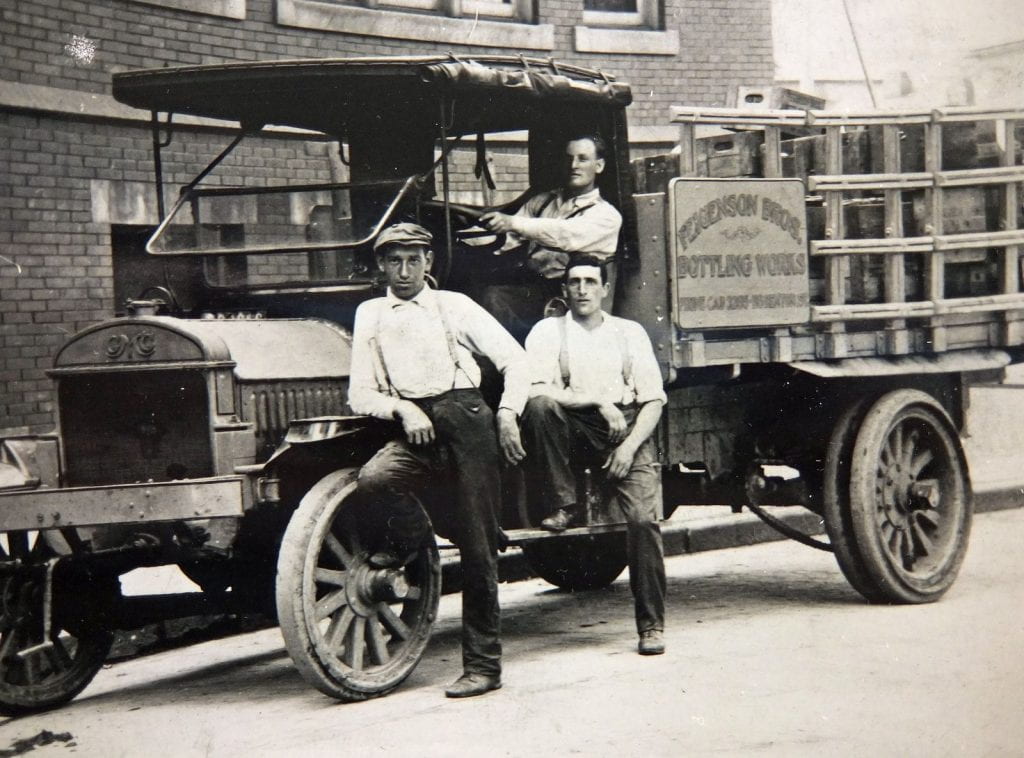The Story of Detroit’s Legendary Soda Pop
This is the story of how Russian Jewish ingenuity transplanted to the Land of Opportunity led to the creation of a drink that is quintessentially Michigan.
In 1905 two immigrants from Russia arrived in Detroit from Cleveland. They joined approximately 30,000 other Russians in Michigan, 17,000 of which were in Detroit, making it one of the major destinations in the U.S. for Russian immigrants. The brothers, Perry and Ben Feigenson, opened a bakery. Within a year they were already making headlines. According to the Detroit Free Press, a baker named Nathan Goldman filed a lawsuit against bakers Perry and two others, Abraham Epstein and Moses Weiswasser, accusing the three of distributing handbills in Hebrew which stated that Goldman was selling old bread. The outcome of the case is unknown, but both Goldman and the Feigensons continued baking for years.
The Feigenson brothers soon opened a bottling business but continued to work as bakers. They then married the two businesses when they began adding frosting flavoring (strawberry, fruit punch, and grape) to their seltzer water. At first, they sold the beverages out of a cart in front of their bakery; later they began driving them around in a horse-drawn carriage. Since the flavored soda-pop only had a one-day shelf life, they would have to make a batch of soda, sell it, then go back and make another batch. This short shelf-life problem plagued the business for years and limited the sale of Faygo to Detroit. In fact, Faygo only became available outside Michigan in 1965.
As the businesses grew, the brothers acquired several properties on Hastings, and for a number of years, the Bottling Works operated alternatively out of 507 Hastings (at the corner of Wilkinson) and 118 Benton. In the 1910s, the brothers focused on making the pop more shelf-stable, and around 1920 they moved into a factory on Beaubien. At that time one bottle cost 3 cents, or you could get two for 5 cents. Coke was much more expensive, selling for 5 cents for one bottle.
A year later, in 1921, Feigensons shortened the name of the company from Feigenson Brothers Bottling Works to Faygo, because it was too difficult to fit the long original name on the bottles.
In 1935, the brothers moved their bottling works for the last time to 3579 Gratiot. This factory was originally built for the Kolb-Gotfredson Horse Company. The German-American Kolb and his German-American son-in-law Gotfredson traded livestock in front of the factory and produced trucks in the building throughout WWI, and then sold the factory to the Feigenson brothers in 1935.
The neighborhood the Feigensons left behind was predominantly Eastern European Jewish in the early 20th century but became predominantly African-American by midcentury. The neighborhood was poor and cramped because African Americans were restricted in where they could live, but many of the residents owned businesses like music venues, barbershops, and social gathering places. The neighborhood was known as Paradise Valley, and famous artists such as Ella Fitzgerald and Louis Armstrong performed at the Valley’s Paradise Theatre. Paradise Valley was demolished in the 1960s to be replaced by the Chrysler
Freeway and other urban renewal projects, and there is no trace of the Feigenson’s original bottling works.
As Faygo’s popularity grew in Michigan and nearby states, the lore surrounding the company has grown. Several articles written by Faygo fans and newspaper reporters claim that the Faygo company coined the word “pop” in reference to soda beverages; however, the Oxford English Dictionary etymology reveals that the word “pop” was used to refer to soda beverages as early as 1812, long before the Feigenson brothers were born. Nonetheless, Faygo’s use of the word “pop” is likely responsible for its usage over the word “soda” in Michigan.
Faygo is now sold throughout the United States, but the shelf-life problem persisted for half a century. The brothers figured out how to make the pop last for about half a year, but it took the company until the 1950s to realize that their unfiltered water was the culprit making their pop go flat. They developed a filtering system and started distributing nationwide in the 1960s. In 1986, the business was sold to Treesweet, and in 2012 the last member of the Feigenson family working for Faygo, Hugh Rosenthal (masters in business administration from WSU), grandson of founder Ben Feigenson, left Faygo.
Faygo is still widely recognized as a Detroit product, but its Russian Jewish connection has largely been forgotten.

